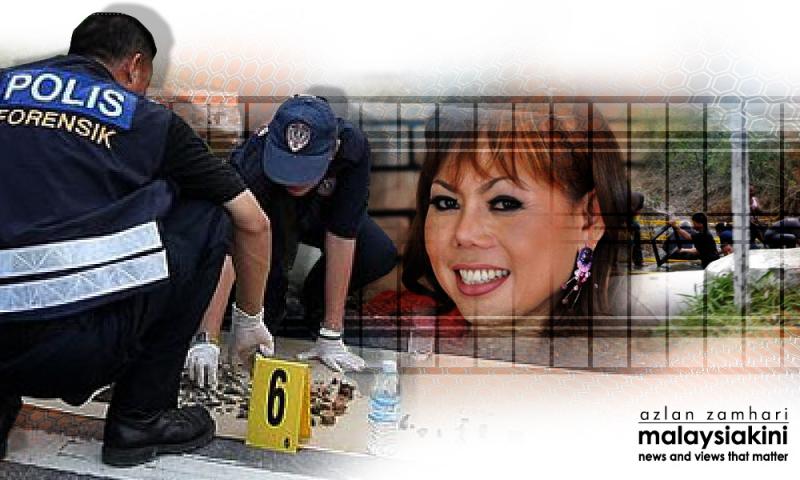Cosmetics millionairess Sosilawati Lawiya and her three aides met their untimely end in the farm at the hands of three appellants, with their bodies incinerated with the use of logs, the Federal Court held today.
Chief Justice Arifin Zakaria, who took an hour and 40 minutes to deliver the court's judgment, said there was violence as bloodstains of deceased persons were found on a bat, two zinc sheets and the wall of the farm house.
"Unless there was violence, no blood would have been splattered on the wall," he said, adding that the existence of fear was also established as prosecution witness, Indonesian maid Siti Hamidah Karnax who was working on the farm testified that she heard screams during the night of that day.
Arifin said there was opportunity for former lawyer, N Pathmanabhan, 47, and farmhands T Thilaiyalagan, 25, and R Kathavarayan, 37 to commit murder.
He said the scene of the crime was a property belonging to Pathmanabhan, and Sosilawati gave notice to him (Pathmanabhan) to meet up with her, which necessitated going to the farm. Evidence also showed Thilaiyalagan and Kathavarayan were his employees.
"In short, when Sosilawati and the three others entered the farm, an opportunity was afforded to the three accused persons to successfully carry out the murders. In short, there was easy passage for the three accused persons to commit the offence," he said.
Arifin also said there was preparation prior to the murders as logs were brought into the farm and evidence by a prosecution witness who testified that she saw fire from burning logs.
"The irresistible inference that may be drawn from the huge fire seen by Siti Hamidah around midnight of the day in question, which scalded the oil palm fronds nearby was that someone went to great trouble to hide traces of any evidence of what had occurred on the night in question, and the fate that had befallen Sosilawati and the three others," he noted.
He said the three of them also attempted to allay suspicion by covering their tracks, subsequent to the murder by burning the bodies in order to disassociate Sosilawati and the three others with the farm, disposing of the items belonging to the deceased and scattered at various locations, and attempting to sidetrack the police by parking Sosilawati's car in Subang Jaya in the hope that the police would be thrown off track.
The Federal Court's five-person panel led by the chief justice rejected the final appeal of Pathmanabhan, Thilaiyalagan and Kathavarayan and upheld their conviction and death sentence for the murder of Sosilawati, 47, bank officer Noorhisham Mohamad, 38, Ahmad Kamil Abdul Karim, 32, and Sosilawati's driver Kamaruddin Shamsuddin, 44.
They were found guilty by the Shah Alam High Court in 2013, of committing the offence at Lot 2001, Jalan Tanjong Layang, Tanjung Sepat in Banting between 8.30pm and 9.45pm on Aug 30, 2010.
In 2015, they lost their appeal at the Court of Appeal.
The other judges were Chief Judge of Sabah and Sarawak, Richard Malanjum and Federal Court judges Suriyadi Halim Omar, Azahar Mohamed and Zaharah Ibrahim.
Meanwhile, the Federal Court panel acquitted third accused R Matan after finding there was insufficient evidence to implicate the 26-year-old for the murders.
Arifin said Matan was just a farm worker and the court found it was unsafe to rely on evidence of a prosecution witness who was declared hostile by the High Court judge. That witness said he saw the farm worker at the farm about 10pm on the day of incident.
He said another prosecution witness also saw Matan unloading logs at the farm before the day of the incident but there was no evidence showing he was involved in the discovery of items.
"We hold that the learned trial judge had erred in calling upon the third accused to enter his defence at the close of the case for the prosecution," he added.
In his judgment, Arifin said two of the sheets of zinc had bloodstains containing the DNA of Kamil and Kamal, while Hisham's DNA was found on the cricket bat.
He said it was the court's finding there was overwhelming evidence before the court to show that Sosilawati and the three others were murdered at the farm within the time and on the date stated in the charges, and that their murders were committed by the three accused persons acting with common intention.
Arifin said evidence also showed that Sosilawati had business dealings through her company, Southern Symphony Sdn Bhd, with Pathmanabhan acting as her solicitor, and they had entered into a joint venture agreement to sell a piece of property by Southern Symphony at an inflated rate and gain in the sale to be shared equally between them.
He said Sosilawati wanted to bring forward the dates of encashment of the two cheques totalling RM4 million issued by Pathmanabhan, and the very reason why she and the three others went to Banting on the day in question.
Outside the court, lawyer Amer Hamzah Arshad said Matan who had been in remand since 2011, was relieved the ordeal was over.
He said Matan would be taken back to the Kajang Prison and subsequently released.
- Bernama






